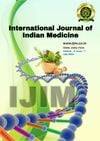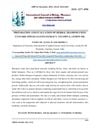Modern shampoos use a mix of surfactants and other ingredients to clean, reduce irritation, and improve performance.
June 2024 in “Lontara Journal Of Health Science And Technology” Candlenut oil alone promotes the most hair growth.
 47 citations,
March 2018 in “Journal of Pharmaceutical and Biomedical Analysis”
47 citations,
March 2018 in “Journal of Pharmaceutical and Biomedical Analysis” Researchers identified new compounds in Platycladi Cacumen and found variations in its flavonoid content, which could aid in its quality control.
 3 citations,
March 2015 in “Biomolecules & Therapeutics”
3 citations,
March 2015 in “Biomolecules & Therapeutics” Phospholipids from pig lungs can significantly promote hair growth.
1 citations,
May 2022 in “International journal of trichology” Most patients were happy with the hair fiber filler and had no serious side effects.
59 citations,
January 2003 in “Phytomedicine” Fennel extract cream can reduce hair thickness in people with excessive hair growth.
 12 citations,
February 2014 in “Recent Patents on Inflammation & Allergy Drug Discovery”
12 citations,
February 2014 in “Recent Patents on Inflammation & Allergy Drug Discovery” Shampoos have evolved into multifunctional products with patented innovations for different hair needs and can include medicinal herbs for hair and scalp health.
 January 2023 in “International Journal of Indian Medicine”
January 2023 in “International Journal of Indian Medicine” Ayurveda offers holistic treatments for hair fall, including therapies and lifestyle changes.
 January 2024 in “International Ayurvedic medical journal”
January 2024 in “International Ayurvedic medical journal” Certain Prakruti types are more prone to early male pattern baldness.
1 citations,
March 2022 in “IntechOpen eBooks” Aging reduces skin stem cell function, leading to changes like hair loss and slower wound healing.
 April 2024 in “Medical & clinical research”
April 2024 in “Medical & clinical research” More research is needed to find the best long-term treatments for Alopecia Areata.
 22 citations,
July 2017 in “BMC complementary and alternative medicine”
22 citations,
July 2017 in “BMC complementary and alternative medicine” Natural remedies for hair and scalp issues are still widely used in Palestine.
5 citations,
September 2019 in “The Open biomarkers journal” Linoleic acid (Vitamin F) can help protect against the harmful effects of acrylamide.
 May 2024 in “Research Square (Research Square)”
May 2024 in “Research Square (Research Square)” Many women in Northern Ghana use plant-based cosmetics like shea butter, and their use is more related to being married than to their job, education, or house.
54 citations,
June 2020 in “Pharmaceutics” New nanocarriers improve drug delivery for disease treatment.
![Integrating Multi-Omics Analyses of Nonomuraea Dietziae to Reveal the Role of Soybean Oil in [(4′-OH)MeLeu]4-CsA Overproduction](/images/research/0eba9759-3aa4-4a06-a70a-2d9c46be53f3/small/23018.jpg) 1 citations,
July 2017 in “Microbial Cell Factories”
1 citations,
July 2017 in “Microbial Cell Factories” Adding soybean oil to Nonomuraea dietziae increases production of a beneficial compound by improving metabolism and enzyme systems.
 January 2024 in “Journal of Pharmacognosy and Phytochemistry”
January 2024 in “Journal of Pharmacognosy and Phytochemistry” Rosemary hair serum promotes healthier, stronger, and shinier hair.
 5 citations,
January 2017 in “Elsevier eBooks”
5 citations,
January 2017 in “Elsevier eBooks” The document concludes that cosmetics need biocompatible, eco-friendly ingredients due to aging populations and demand for effective products.
 July 2022 in “International journal of Ayurvedic medicine”
July 2022 in “International journal of Ayurvedic medicine” The new herbal shampoo effectively controls dandruff using natural ingredients.
2 citations,
December 2016 in “Springer eBooks” Dermatologists need to understand diverse cultural hair practices to offer better care.
 3 citations,
January 2017 in “Journal of cosmetology & trichology”
3 citations,
January 2017 in “Journal of cosmetology & trichology” The nutritional supplement improved hair quality and reduced hair loss.
 January 2024 in “Deleted Journal”
January 2024 in “Deleted Journal” Essential oils like lavender, chamomile, and bergamot help manage stress and improve well-being.
 November 2024 in “International Journal of Biology Pharmacy and Allied Sciences”
November 2024 in “International Journal of Biology Pharmacy and Allied Sciences” The herbal shampoo is safe, effective, and may reduce hair loss and promote growth.

Pumpkin roots contain compounds like Alpha-spinasterol, squalene, and palmitic acid, which may have health benefits like reducing depression, treating certain cancers, and having antibacterial properties.
 1 citations,
April 2024 in “International Research Journal of Modernization in Engineering Technology and Science”
1 citations,
April 2024 in “International Research Journal of Modernization in Engineering Technology and Science” Herbal shampoo cleans hair well and is safer than regular shampoos.
Rosemary oil effectively promotes hair growth in mice.
 4 citations,
October 2022 in “Elsevier eBooks”
4 citations,
October 2022 in “Elsevier eBooks” Plant saponins from Indian plants are natural, cost-effective, and safe for use in soaps, detergents, and hair care products.
 October 2024 in “Current Trends in Biotechnology and Pharmacy”
October 2024 in “Current Trends in Biotechnology and Pharmacy” The shampoo effectively promotes hair growth and is halal-compliant.
November 2022 in “Journal of Cosmetic Dermatology” The combined therapy significantly increased hair density and was safe for treating hair loss.
7 citations,
January 2012 in “International journal of trichology” Permanent hair removal with lasers may cure itchy black hair bristles on the back.








![Integrating Multi-Omics Analyses of Nonomuraea Dietziae to Reveal the Role of Soybean Oil in [(4′-OH)MeLeu]4-CsA Overproduction](/images/research/0eba9759-3aa4-4a06-a70a-2d9c46be53f3/small/23018.jpg)









